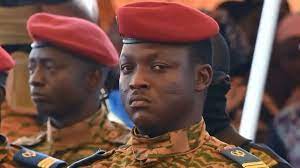Captain Ibrahim Traore is leading a bold exercise in national self-evaluation through a series of meetings with stakeholders depicting unsettling truths about insecurity in Burkina Faso.
Without mincing his words a 12:45 video of a meeting with political parties and CSOs last Friday which was broadcast on national television and on the Facebook page of the Presidency, Captain Traore described the difficult security situation in his country in unflattering terms.
In power since early October 2022, the head of state recalled the origins of terrorism in Burkina Faso, which he blamed mainly on poor governance by successive regimes.
“I walked to cross the Sahel… There is nothing there. What have we built, what have we done seriously in this area? Who is responsible? We are,” Ibrahim Traore said.
The junta leader said despite multiple warnings, nothing has been done in terms of ending the neglect of regions now under the yoke of armed insurgents.
“We are the ones who have created this situation. We have done everything to ditch certain peoples… because of selfish interests…We are responsible for the misfortune that is happening to us,” he emphasised.
With his straight-talking, the people of Burkina Faso have just discovered that Captain Traore pulled no punches against politicians he accused of infiltrating and politicizing the army to the point that each soldier acts according to his side of the country’s political divide.
Traore said with the advent of Lieutenant Colonel Paul-Henri Damiba to power after his January 24th coup, he had entertained hope for a while that “the mess would stop, but it continued unabated”.
Captain Traore also flayed the attitude of city dwellers who, according to him have not grasped the gravity of the security situation in the country.
“I bet that people are seriously unaware of the situation in which we find ourselves. In the big cities, life is very different. Outside the cities, you can’t even imagine what’s going on. Are you aware that the territory is almost lost?”
To illustrate his point, the 34-year-old used the example of regular terrorist attacks on National Highhway No. 1, linking the capital Ouagadougou to Bobo-Dioulasso.
“It is when the road is cut off that some people start to understand,” the junta leader stressed.
Captain Traore depicted a catastrophic humanitarian situation unfolding as a direct consequence of the security crisis.
He also spoke about the stark contrast between the relative security and comfort of the urbanites and the case of “children who have skins barely covering their bones, old people dying of hunger, women who can no longer breastfeed because they no longer have anything in their bodies…and people who eat grass” in the areas occupied by the jihadists.
Captain Traore’s “language of truth” also denounced the lack of solidarity among the people of Burkina Faso in this difficult juncture of its history.
”Traders outbid each other in renting trucks to supply the areas under GAT blockade…What is the integrity? Burkina Faso, where is integrity…There is no mercy…The Burkinabe have no sympathy for each other…People die elsewhere, but in Ouagadougou they celebrate” he complained.
He exhorted political and civil society activists to conduct their own national introspection with the same frankness.
Having stated his unvarnished truths, Captain Traore threw the gauntlet at his compatriots, saying “The future of this country is in your hands…Everyone is free, from this moment on, to act either for the country or against the country”.
For Fabe Mamadou Ouattara, a journalist with the state-owned daily Sidwaya, Captain Ibrahim Ouattara spoke his mind to the political class and civil society, blaming them for “dragging the country into this situation”.
Ouattara, a political observer in his own right said given Traore’s bid to establish his authority, ‘he appears to be using the notoriety of these sections of Burkinabe society to win more support.
“Captain Ibrahim Traore also accuses the army, but he seems to be saying that he is in charge of getting the army on the right track and asking others to keep a low profile if they do not want to go along with the transition,” the journalist observed.
DS/ac/fss/as/APA


